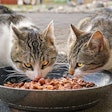The objectives of this study were to determine differences in apparent total tract energy and macronutrient digestibility, fecal and urine characteristics and serum chemistry of domestic cats fed raw and cooked meat-based diets and extruded diet. Dietary treatments included a high-protein extruded diet (EX, 57% crude protein), a raw beef-based diet (RB, 53% CP) and a cooked beef-based diet (CB, 52% CP) fed to nine adult female domestic shorthair cats.
Apparent total tract DM, OM, CP, fat and GE digestibilities were greater in cats fed RB and CB than those fed EX. Total fecal short chain fatty acid (SCFA) concentrations did not differ among dietary treatments; however, molar ratios of SCFA were modified by diet, with cats fed RB and CB having an increased proportion of fecal propionate and decreased proportion of fecal butyrate compared to cats fed EX. Fecal concentrations of ammonia, isobutyrate, valerate, isovalerate and total branched-chain fatty acids were greater in cats fed EX compared to cats fed RB and CB.
Our results indicated cooking a raw meat diet does not alter apparent total tract energy and macronutrient digestibility and may also minimize risk of microbial contamination. Given the increasing popularity of feeding raw diets and the metabolic differences noted in this experiment, further research focused on the adequacy and safety of raw beef-based diets in domestic cats is justified.
Source : K.R Kerr et al., 2011. Apparent total tract energy and macronutrient digestibility and fecal fermentative end-product concentrations of domestic cats fed extruded, raw beef-based and cooked beef-based diets. J. Anim. Sci. online October 2011. doi: 10.2527/jas.2010-3266


















